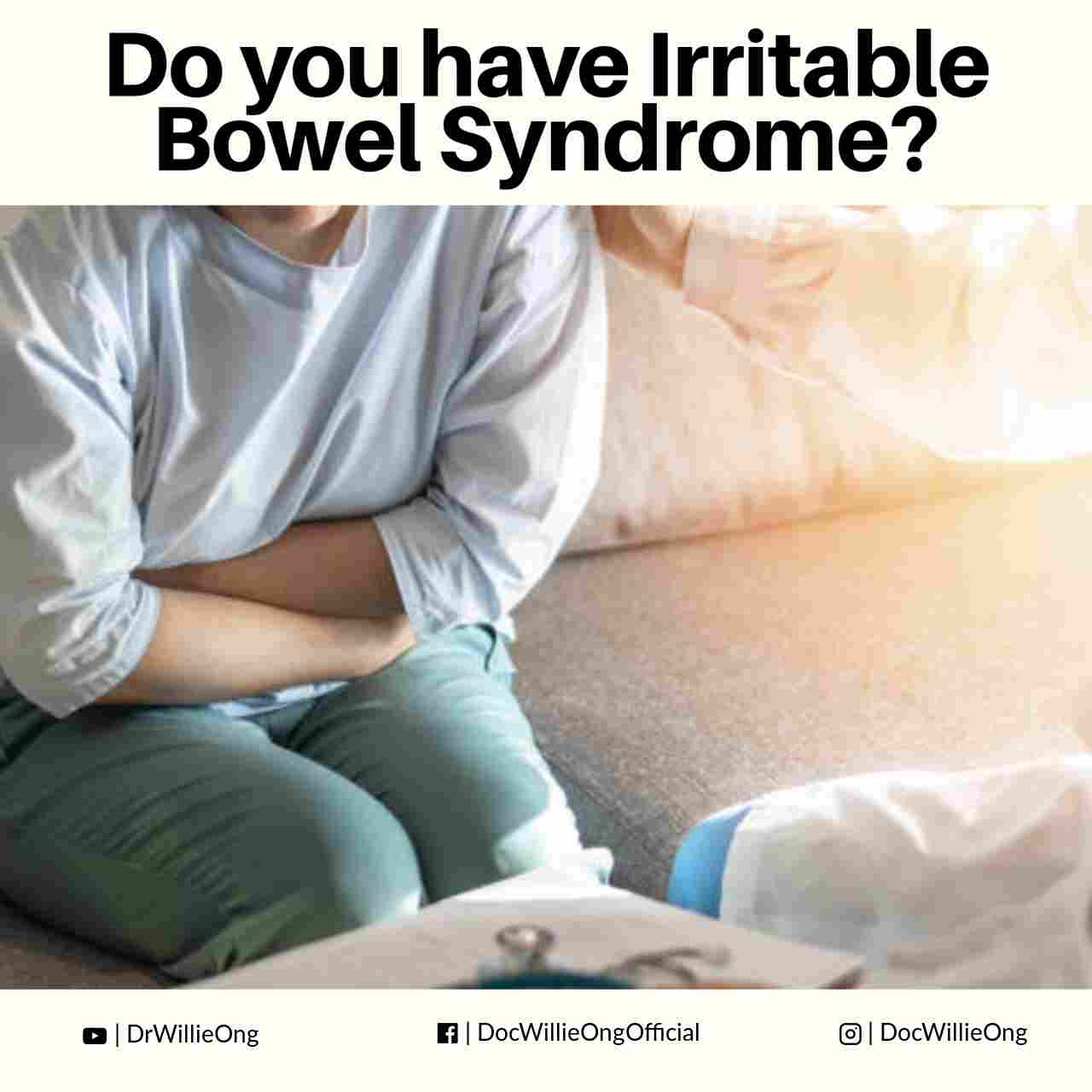By Dr. Willie Ong
Do you usually have abdominal pain and cramping? Is this followed by soft stools and bloating of the stomach? Do you feel your stomach acting up, getting noisy and uncomfortable especially in times of stress? Do you have bouts of diarrhea or constipation? If so, you could have Irritable Bowel Syndrome or IBS.
But don’t despair, millions of people have it. In Japan, 40% of individuals have an irritable bowel, probably from stress. IBS can be inherited and usually occurs in anxious or depressed individuals.
Today, I’m writing not as a doctor, but as a patient because I also have IBS. Personally, I don’t like the term IBS. A nervous bowel or an overactive (overacting) bowel is more palatable for me.
Diagnosis and Possible Causes
If your looking for a weakness of medical science, then IBS is definitely one of it. Just imagine, there is no laboratory test to confirm the disease. You can only say that a person probably has IBS based on vague symptoms like abdominal cramps, bloating, frequent diarrhea, and/or constipation. It’s a strange feeling like you need to move your bowels again even after you’ve just been to the bathroom. Medically, doctors formulated the Rome’s Criteria for IBS. (Again, like many patients, I dislike being boxed into a disease.)
If you read the standard medical textbook, there is no definite cause for an irritable bowel. They say it has something to do with “sensitive” nerves, which is a nice way of saying “we don’t know anything at all.”
What about stress? Doctors are divided whether stress can cause IBS. From my experience, stress definitely worsens symptoms of IBS, especially mental stress like work, deadlines and life’s problems.
Problems with Medical Treatment for IBS
In 2001, I diagnosed myself to have IBS based on the symptoms mentioned. Then I consulted an expert who did an endoscopy, which came out fairly clean. (They look inside your stomach with a scope.)
However, my doctor said that we cannot be absolutely sure that I don’t have cancer so I still need to undergo a bowel enema, maybe even a CT scan. (Rule No. 1 for doctors: Never mention the big C when the chances of getting it are slim, especially in cases of IBS.)
I argued that my symptoms are just cramping and sometimes diarrhea, which most people experience. We also don’t have a history of cancer. “What’s the bowel enema for?” I asked. Well, my doctor said he also wants to rule out a Lymphoma. (Rule No. 2 for doctors: Never blurt out an incurable disease when there is no reason to say so.)
I left the doctor’s clinic in a daze. I wondered how many thousands of patients are subjected to such unnecessary mental anguish from loose words from a doctor.
Next, I was bombarded with so-called pills for IBS symptoms, like Tegaserod, Domperidone, Buscopan, Loperamide, and what have you. I got sicker after taking these drugs so I decided to stop them all. It was 3 years of agony while searching and understanding this disease.
After my research, I concluded that the side effects of these drugs outweigh its benefits. I am saddened at the marketing strategy used by the drug companies to pump unproven drugs for unsuspecting patients with IBS like me.
Alternative Therapy for IBS
Thank God for alternative and natural remedies. They are less toxic to the body and, in my case, turned out to be an effective cure.
Take green leafy vegetables and bananas.
I’ll share with you my secret formula for IBS. If you have bouts of diarrhea, try to eat more bananas. They’re like a miracle food. Bananas help coat the stomach and protects it from too much acid. It also helps form your stools. On the other hand, if you have constipation, try to eat more high fiber vegetables like patola, kangkong, okra, pechay and brocolli. They help normalize your bowel movement.
Avoid Western medicine.
Stay away from laxatives. They can weaken the linings of your bowels. I suggest that readers be careful with drugs for IBS. They’re not proven yet. See if your symptoms are better off with or without medicines.
Take frequent sips of water.
This advice is good also for those with ulcers and gastritis. Taking regular sips of water, like 3 gulps every 15 minutes, washes off the acid in the stomach. Try to drink 10-12 glasses every day.
Eat the same food at the same time everyday.
I know this sounds hard but since our bowels are picky with new acquaintances, try to eat similar foods everyday, and at the same time. My eating schedule is 7 AM, 10:30 AM, 12 Noon, 4 PM and 7 PM and 9 PM. Six small frequent feedings.
Our stomachs love carbohydrates and warm foods, like congee, rice, vegetables and soup. It dislikes spicy foods, taco chips, cold water and too much milk. However, each person is unique. Keep a food diary of what is pleasant or unpleasant to your stomach. Know the foods that make your stomach contented and happy.
Release stress and relax.
If you are angry, tell a friend about it. If you are irritated, resolve the conflict with your spouse or friend. Bottling the anger inside you will affect your bowels.
There are many other things you can try, like Yoga, meditation, spas, music therapy or traveling. Just be careful with your food when you travel
Try non-caffeinated teas.
You can try taking warm soothing teas like Chamomile tea or Peppermint tea. Try it at night for relaxation.
Pray and lift it up to God.
I know you might think it’s silly, but prayers have really helped me with my irritable bowel. When the bowels act up, usually there is a stress involved and knowing this helps me accept the problem. I follow the food plan I’ve listed above and then I just pray away the pain.
Keep your mind calm even if your bowels are not. Then I inevitably fall asleep, and the pain is gone in the morning.
Some people will get turned off when I say that most ailments can be cured by having a peaceful mind and a positive attitude. But I sincerely believe it will help patients in the long run. Soon you will get the hang of it. Don’t despair, living with an irritable bowel is easier than you think.



